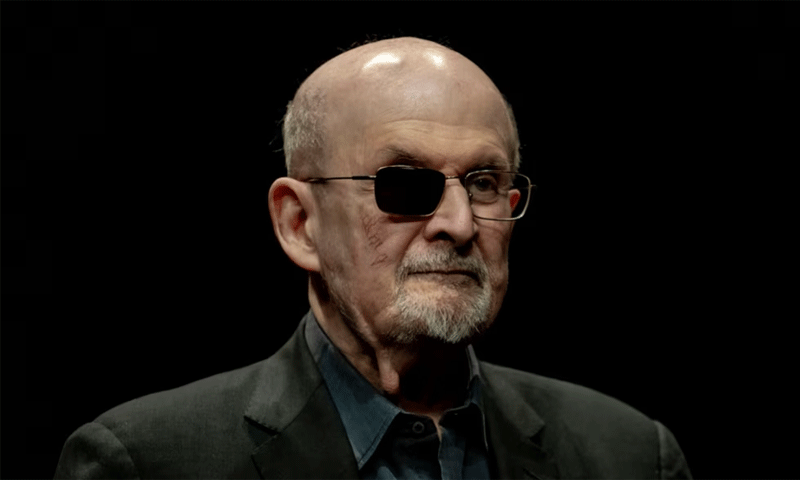Controversial Book “The Satanic Verses” by Salman Rushdie Resurfaces for Sale in India, Sparks Outrage

Islamabad:In a controversial development, Salman Rushdie’s book *The Satanic Verses*, which was banned in India for decades, has once again appeared for sale in the country. The book is being sold at *Bahri Sons Book Sellers* in Delhi for ₹1,999. The store’s owner, Rajni Malhotra, confirmed to local media that the book was recently acquired and its sales have been positive.
This move has ignited a fresh wave of protests from various Muslim religious organizations. Groups such as the All India Muslim Personal Law Board, All India Shia Personal Law Board, Jamaat-e-Islami Hind, and Jamiat Ulema-e-Hind have strongly condemned the sale and have called on the Indian government to take appropriate action against the book’s circulation.
**The History of the Ban:**
*The Satanic Verses* was banned in India in 1988 under the then-Prime Minister Rajiv Gandhi’s government. The ban was challenged by a reader named Sandipan Khan in the Delhi High Court. During the hearing, the court asked the authorities to present a copy of the notification that had imposed the ban, but the administration failed to produce it. The court, in its remarks, stated that the absence of the notification could be interpreted as the ban no longer being in effect. Many saw these comments as the lifting of the ban, despite the government’s lack of formal acknowledgment.
**Muslim Organizations React:**
Dr. Syed Qasim Rasool Ilyas, spokesperson for the All India Muslim Personal Law Board, told Voice of America that the absence of the notification’s copy does not change the situation. He stressed that as long as the government does not officially announce the lifting of the ban, the prohibition should still stand. He called for the arrest of those selling the book, emphasizing that selling a banned book is illegal.
Dr. Ilyas added that the issue is not just about Indian Muslims but concerns Muslims worldwide, as the book contains offensive material about the Prophet Muhammad. He pointed out that this book had already been condemned by Muslims around the world, and a fatwa was issued against Rushdie.
Jamaat-e-Islami Hind’s Deputy Amir, Malik Muttasim Khan, also condemned the book’s sale, saying that no book which insults religious figures should be supported. He argued that in any civilized society, freedom of expression should not be used as an excuse for inciting hatred or insulting religious figures.
**Violent Protests and Global Backlash:**
*The Satanic Verses* triggered violent protests worldwide, especially in Muslim-majority countries. Iran’s spiritual leader, Ayatollah Khomeini, issued a fatwa calling for Salman Rushdie’s death, shortly before his death in 1989. Protests erupted in Tehran, the British Embassy was stoned, and a bounty of $3 million was placed on Rushdie’s head.
The book was banned in 20 countries, and Rushdie went into hiding for several years. In 1991, the Japanese translator of the book was murdered, and another Italian translator was attacked with a knife. Two years later, the Norwegian publisher of the book was shot.
**Assault on Salman Rushdie:**
In August 2022, Salman Rushdie was attacked during a public event in New York, where he was stabbed on stage. The attack resulted in the loss of vision in one of his eyes and left one of his hands severely damaged.
Rushdie’s birthplace, Mumbai, witnessed violent riots during the book’s protests, leading to the deaths of 12 people.
**Opposition to the Ban:**
While the ban on *The Satanic Verses* has had significant support, there has also been criticism. The Indian government clarified at the time that the ban was not on the book’s content but on its import and Rushdie’s arrival in India. The book was not published in India but was brought into the country illegally.
Those who opposed the ban argued that it was imposed due to pressure from Muslim religious groups. Salman Rushdie himself wrote a letter to Prime Minister Rajiv Gandhi criticizing the ban. Former Prime Minister Atal Bihari Vajpayee also opposed the ban, stating that a book should not be banned merely because it is controversial. He suggested that anyone who disagrees with a book should respond by writing a counter-book.
**Ongoing Debate:**
The renewed sale of *The Satanic Verses* in India has reignited debates about freedom of expression, censorship, and the balance between protecting religious sentiments and upholding individual rights. As the controversy continues, many are calling for a resolution that respects both the cultural sensitivities of religious communities and the rights of authors to publish their work without fear of retaliation.





